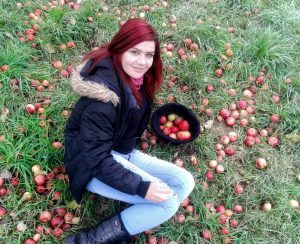During the first week of September 2015, our shift teams were involved in 62 emergency situations in the Aegean Sea. On one of the many rubber boats sat Safinaz* with her husband and dozens of other travellers from Syria. All of a sudden, their small engine failed them, and they were adrift in Turkish waters. Panic broke out; many were unable to swim and thought they would die. Some were in such panic that they wanted, somehow, to return to Turkey, but most were set on reaching Lesvos Island. While waiting for the departure of their boat, Safinaz had neither slept, nor eaten, and now on the unstable boat with waves coming in, she felt sick. But she took her phone out, thinking about ways to reach out for help. A fellow traveller had written a phone number onto his arm and while nobody really knew what this number was about, Safinaz dialled it, and this is how she reached the Alarm Phone.
In our first anniversary brochure, we showed some of the WhatsApp distress messages from Safinaz that had reached our shift team member Berta*. They stayed in touch, also after Safinaz had safely reached Lesvos, and we could thus follow her migration trajectory throughout Europe – via the Balkans to Germany. Nearly two years after our first exchange on WhatsApp, Berta and Pyoung Whoa drove to a small town in northern Hessen to visit her. When she opened her door, we also met her two children, who had only recently come to Germany from Damascus, through family reunification. They had been apart for one and a half years.
In fluent German, Safinaz recounted their experiences on that day, the 2nd of September 2015, when she feared for their lives. She said, if she had known how it would turn out to be, she would not have migrated in this way. Several attempts to cross the Aegean Sea had failed, and when the engine broke down in Turkish waters, it seemed that they would have to try it once more – if they survived. She said that being aware that Berta was following their distress case, and thus knowing to be seen and heard, was encouraging and relieving. At some point the engine reignited and the Greek coastguards that we had alerted after the boat entered Greek waters, did not even have to intervene. The boat reached Lesvos independently and landed on a beach in the north of the island – like hundreds of other boats around that time. In Turkey, Safinaz and her husband had ‘adopted’ a Syrian boy, promising his parents to bring him safely to Germany and his uncle there. But first, the three of them were stuck on the Greek island for about two weeks.
During that time, thousands of travellers reached the island, and tens of thousands had to stand in line in the scorching sun for days waiting for their registration, with tensions running high and fights breaking out frequently. The three made it to Athens and took some days to rest. Only a few days earlier, thousands of travellers had left the Keleti train station in Budapest and had launched the March of Hope, which opened the Balkan corridor and thereby cleared the path also for Safinaz. They made it to Hungary, just in time before the fence was put up, and swiftly moved on to Vienna. They decided to go to Hamburg – a place they had heard good things about – but on their way the police stopped them and they were sent to Beberbeck, a district of the small German town Hofgeismar in Hessen.
She felt welcome but struggled to find reception for her phone in order to reach out to her family in Syria. Back then, she told Berta via WhatsApp: ‘This place is suitable for horses .. cows .. not for human beings’. But at least it was a quiet place to rest, after their strenuous journey, where she could take up her great passion again. Safinaz is an artist and designer, who draws impressionist paintings and makes sculptures from whatever material she can find. After moving to northern Hessen, she offered art courses to refugees and she is currently working toward an exhibition of her work. In the living room, one of her paintings shows the Umayyad Mosque of Damascus, one of the oldest mosques in the world.
Before we leave her place, we promise to meet soon again. She agrees to be filmed for a video clip, in which she tells her story and encourages those who are still on their way to stay strong, to keep struggling. She asks us to send her some questions in advance, so that she can prepare what to say in German. But the video is meant for travellers and travellers to be, so we ask her to speak in Arabic. She laughs and says, ‘in that case I don’t need to prepare, I know exactly what I want to tell them’.
* Names changed

